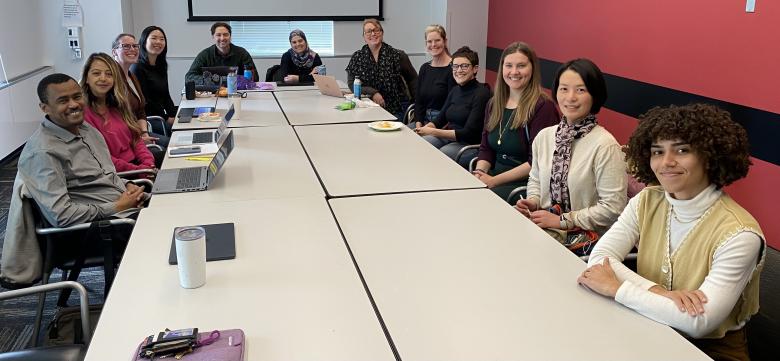
The Writing@UW Fellowship just completed its second year, continuing in its mission to support faculty teaching W courses who want to take their writing instruction to the next level. The program took place during Winter Quarter 2024-25 and introduced a new partner model, encouraging faculty to collaborate within their departments or closely affiliated units. Fellows worked together to (re)envision writing in their disciplines and refine their teaching and learning practices. Fellows participated in weekly meetings to engage with WID/WAC scholarship, discuss key issues such as multilingual learners and writing, antiracist assessment practices, and ethical use of AI, and workshop their project plans.
Explore the work from the 2023-24 pilot year of the Fellowship in our program archive, and explore the 2024-25 cohort's project below.
The Learning Goals
- Understand and teach the fundamental relationship between writing and learning
- Learn about and use the UW guidelines for teaching W courses
- Use writing as a means to leverage criticality, equity, inclusion, and belonging in their classes
- Develop strategies and materials for effective writing instruction
- Complete a project that enhances writing instruction in their course
- Create a community of teachers who share the same goal: excellence in writing instruction
- Advocate for writing in their department or program while fostering collaboration around writing pedagogy
The 2024-25 Cohort & Projects
Fellows in the 2025 cohort worked in pairs to design and implement an intensive alteration of or addition to a teaching resource or course in their department, school, or college. These projects aimed to address broader disciplinary needs and foster equitable, effective writing instruction.
- Chrystel Oloukoï (Geography) and Morgan Vickers (Law, Societies & Justice) worked on two projects that intersect: Dark Ecologies and Reparations: Race, Recognition, and Remediation. Together, they explored how form, genre, and scaffolding can support students in developing nuanced, interdisciplinary arguments.
- Sirine Maalej and Eli Patten (Mechanical Engineering), for their project, ME Right Good: Writing Through the Mechanical Engineering Curriculum, evaluated technical communication instruction in ME 354 and 493 to align learning objectives as students move through the sequence, as well as to incorporate effective assignments that reinforce core competencies.
- Mehari Worku and Melike Yucel-Koc's (Middle Eastern Languages & Cultures) worked on Enriching the Gateway to the Middle East Through Writing, a project that envisions writing assignments that center student critical thinking, spark interest in Middle Eastern studies, and encourage deeper engagement through low-stakes assignments and a culminating project.
- Jasmine Kaneshiro and Sydney Record's (Nursing) project, Revising and Scaffolding Assignments to Build Knowledge and Demonstrate Learning, is a substantial revision to a two-course sequence, looking into final project assignments and related scaffolding assignments to purposefully differentiate the class projects and ensure that the classes build on, rather than repeat, each other.
- Amanda Doxtater and Olivia Noble Gunn's (Scandinavian Studies) project, Literature, Film, and the Nordic Child, draws on their research in child, queer & gender, film, and cultural studies in Scandinavia to revive and revitalize a course to include not only children’s literature but also the imagination and politics of childhood and youth culture in the region.
The Writing@UW Fellowship is a collaborative effort to enhance writing instruction across disciplines and foster a culture of innovation, equity, and excellence in teaching. We invite you to explore the inspiring work of our fellows, reflect on the transformative potential of writing in your own teaching, and connect with us as we build a community committed to advancing writing across campus.
Applications for the 2025-26 Writing@UW Fellowship will open during Fall Quarter 2025. Please contact Megan with any questions.
Megan Callow (Director of Writing@UW) welcomes your questions: mcallow@uw.edu